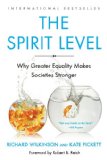Summary | Excerpt | Reviews | Beyond the book | Read-Alikes | Genres & Themes | Author Bio
Why More Equal Societies Almost Always Do Better

Critics' Opinion:
Readers' Opinion:
First Published:
Dec 2009, 352 pages
Paperback:
Apr 2011, 352 pages
 Book Reviewed by:
Book Reviewed by:
Jo Perry
Buy This Book
The Spirit Level will change the way you think about life, liberty and the pursuit of happiness, especially if you live in the United States. You will reexamine what it means to be successful, how you will seek and achieve personal satisfaction, and what you owe your fellow citizen.
Epidemiologists Richard Wilkinson and Kate Pickett studied income inequality in America's 50 states and the 23 richest countries in the world - excluding those with populations below 3 million, those that are tax havens, or those from which they could not get reliable data - to track the effect of income equality on quality of life, health and life expectancy, rates of violence, social mobility, and educational performance. What they found is that equality and inequality are infectious: the more economically equal a society, the happier, healthier and more sane and peaceful it becomes - not just for the most fortunate, but for everyone: "...we are affected very differently by the income differences within our own society from the way we are affected by the differences in average income between one rich society and another." The authors posit that despite affluence, marked difference in status in economically hierarchical societies "gets under the skin" of its members. Rates of depression and anxiety rise as a society becomes more unequal because human beings are especially sensitive to forces that threaten loss of "social esteem."
Especially intriguing are Wilkinson and Pickett's discussion of economic inequality as the source of a decline in modesty and community in the U.S., and their discussion of imprisonment and punishment. The authors argue that Americans, who live in one of the most unequal societies on earth, would rather destroy social bonds than present themselves as less able than others. The authors contrast American self-promotion with the self-deprecating behaviors typical of the Japanese, who live in the most economically equal nation. I also found their discussion of rates of imprisonment illuminating: U.S. prison populations have been growing since the 1970's, not, as I had imagined, because of a huge increase in "criminal offending," but because the length of prison sentences in the U.S. have increased: "...in the USA, people are sent to prison more often, and for longer, for property and drug crimes than they are in Canada, West Germany and England and Wales."
Wilkinson and Pickett illustrate their findings through graphs throughout the book and cite numerous studies. One, about "mirror neurons" was so interesting it led me to the Internet, where I learned that Wilkinson and Pickett were guilty of presenting a consensus among scientists where there is none. While the graphs and statistics are necessary to their argument, I would have liked first-person accounts of life in equal and unequal societies, and interviews with researchers about their work and its implications. The authors end their book with a call for economic equality through various means, for the good of mankind and of the planet. They advocate employee-ownership models and a variety of alternatives to what they call "the standard capitalist model." But just how we transform economic hierarchies into egalitarian communities remains unclear. Despite the vagueness of the egalitarian future they envision, and the sometime less-than-persuasive data in support of their arguments, Wilkinson and Pickett leave the reader to grapple with a powerful and disconcerting idea:
"Economic growth, for so long the great engine of progress, has, in the rich countries, largely finished its work. Not only have measures of wellbeing and happiness ceased to rise with economic growth but, as affluent societies have grown richer, there have been long-term rises in rates of anxiety, depression and numerous other social problems. The populations of rich countries have got to the end of a long historical journey… as the relationship between health and economic growth have leveled off, so too has the relationship with happiness… [In] affluent developed countries, further rises in income count for less and less."
A note regarding the title: The Spirit Level has two meanings - while one will be obvious to all, the other maybe lost on those who are not British. A "spirit level" is the common British term for what others refer to as a bubble level - a device used for determining whether a surface is horizontal (level) or vertical (plumb). Thus the title could be read as referring to both the balance of equality and also the spirit of the people engendered by that balance.
![]() This review was originally published in The BookBrowse Review in February 2010, and has been updated for the
May 2011 edition.
Click here to go to this issue.
This review was originally published in The BookBrowse Review in February 2010, and has been updated for the
May 2011 edition.
Click here to go to this issue.

If you liked The Spirit Level, try these:

by Bob Harris
Published 2014
After making hundreds of microloans online, Bob wanted to see the results first-hand, so he travels from Peru and Bosnia, to Rwanda and Cambodia, introducing us to some of the most inspiring and enterprising people we've ever met.

by Wendell Potter
Published 2011
In Deadly Spin, Potter takes readers behind the scenes to show how a huge chunk of our absurd healthcare spending actually bankrolls a propaganda campaign and lobbying effort focused on protecting one thing: profits





The Flower Sisters
by Michelle Collins Anderson
From the new Fannie Flagg of the Ozarks, a richly-woven story of family, forgiveness, and reinvention.

The House on Biscayne Bay
by Chanel Cleeton
As death stalks a gothic mansion in Miami, the lives of two women intertwine as the past and present collide.

The Funeral Cryer by Wenyan Lu
Debut novelist Wenyan Lu brings us this witty yet profound story about one woman's midlife reawakening in contemporary rural China.
Your guide toexceptional books
BookBrowse seeks out and recommends the best in contemporary fiction and nonfiction—books that not only engage and entertain but also deepen our understanding of ourselves and the world around us.